In recent months, new versions of existing compact pistols have been introduced with new features and improvements. At least we hope the added expense and modifications are improvements. The trend is toward greater magazine capacity, improved sights, and sometimes a longer slide and barrel while maintaining a subcompact grip style.
The SIG P365 XMacro is perhaps the most modified of any of these new handguns with a compensator, larger grip, and the addition of grip inserts, not to mention a 17-round magazine. Similarly, Taurus took the GX4 and gave it a long slide similar to the SIG P365XL’s treatment. These seem like fitting improvements in shooting performance. Perhaps concealed carry is compromised slightly by longer barrels and magazines. Meanwhile, a custom operation known as Shield Arms has redesigned the magazine catch and magazines of the Glock 43X, offering 14-round steel magazines for the pistol. So to explore these new carry options, we faced off the two factory handguns and the Glock 43X converted to bigger magazines to see who would run.
Do you need the expensive SIG XMacro? Is the slightly longer slide of the Taurus beneficial? Should you simply modify the 43X to a higher capacity? In the end, one pistol answered these questions and stood above the others in combat ability, but another failed to function properly. Here’s what we found.
Gun Tests Grade: B+
$803
Our base gun cost was $488. We added Ameriglo sights for $90, Shield Arms magazines and magwell conversion for a total price of $215, and Talon grips for $10. The Glock 43X is actually slightly less expensive than it was a couple of years ago, with supply finally catching up to demand. We added a few items to bring the pistol up to high-capacity standard. The pistol is a compact Glock handgun that is basically a long-handle version of the Glock 43. The Glock 48 is a longer-slide version of the Glock 43X. Results will be similar with the Glock 48. The 43X is by far the more popular handgun than the Glock 48. While we concentrated on this 43X, we also ran a side test with stainless-slide pistol to evaluate the Shield magazines’ performance in pistols without the metal magazine catch.
| Action Type | Semi-auto locked breech, double action only |
| Overall Length | 6.5 in. |
| Overall Height | 5.05 in. |
| Maximum Width | 1.1 in. |
| Weight Unloaded | 16.5 oz. |
| Weight Loaded | 21.0 oz. |
| Barrel | 3.4 in. long, carbon steel |
| Slide | Dark oxide steel |
| Slide Retraction Effort | 15.0 lbs. |
| Receiver Material | Polymer |
| Grips | Pebbled polymer, Talon Grip added |
| Grip Front Strap Height | 2.5 in. |
| Grip Back Strap Height | 3.0 in. |
| Grip Thickness (Maximum) | 0.9 in. |
| Grip Circumference (Maximum) | 5.5 in. |
| Magazines | (1) original 10 round, (2) Shield Arms 14 round; upgraded magazine catch |
| Rear Sight | Ameriglo Tritium, two white dots |
| Front Sight | Ameriglo Tritium, one white dot |
| Trigger Pull Weight | 5.6 lbs. |
| Trigger Span | 2.64 in. |
| Safety | Trigger lever, striker block |
| Warranty | 1 year |
| Telephone | (770) 433-8719 |
| Website | USGlock.com |
| Made In | U.S. |
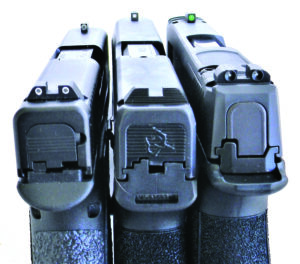
The Glock 43X has been tested before with excellent results. Reliability is the long suit of the Glock handgun. The big difference here is the addition of Shield magazines, which are steel units and hold 14 rounds of 9mm ammunition. Considering the compact dimensions of the 43X, this is quite an improvement over the 10-original magazine. Before adopting the pistol for personal defense, one of the raters fired 400 rounds of 9mm Luger in six Shield magazines without any type of failure. This wasn’t done under Gun Tests controlled testing, but just the same is a reliable test and one of the reasons the Glock 43X was included in the test. Shield Arms also offers a metal magazine catch for the Glock 43X. We consider this easily installed unit an improvement over the polymer factory catch and a must have for using metal magazines. The Shield magazines are well made and seem robust enough for service use. We also tested the pistol with Glock factory magazines for comparison. Ameriglo sights bring the pistol up to be a fair competitor to the night-sight equipped SIG. These sights are not in the same class as the SIG’s for brightness and sharp sight picture, but they worked well enough. The Talon grip may not have been completely necessary, but it certainly improved the Glock’s gripping surface for very little time and effort. The Glock 43X features a thin grip designed for concealed carry. With the Talon grips, the gripping surface is ideal.
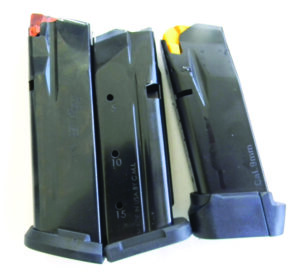
At the range, we found the Glock was fast on target and handled well in combat firing. No surprises there, but we also noted the pistol was not as comfortable to fire as the other handguns. This is simply a factor of weight and the width of the grip. Recoil was never painful or uncomfortable. While combat accuracy slightly shaded the Taurus GX4’s results, they were not as good as the SIG’s.
The Glock lagged behind the SIG in accuracy as well. This is a good smaller gun that doesn’t shoot as well as a good larger gun. We would recommend simply purchasing the SIG XMacro 9mm because the improvements of the Glock brought it into the same price strata as the SIG. However, if you already have a Glock 43X, the improvements are worthwhile.
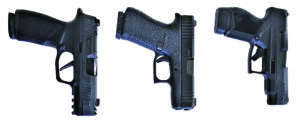
The big question was the reliability of Shield magazines. At this point we have tested eight of the magazines. During the test with the 43X, we experienced a couple of failures to feed (short cycles) when loading the magazine into a slide-down pistol and then racking the slide. If loading in the proper manner for automatic pistols — with the slide locked to the rear and the magazine inserted and the slide dropped — there were no problems. We tested one Shield Arms magazine that functioned properly, but the magazine would not load to full capacity. It was down one round when fully loaded.
Our Team Said: We believe the Shield magazine is a trustworthy addition to the Glock 43X pistol based on the raters’ experience with six magazines and more than 600 rounds of ammunition fired. While the SIG XMacro outshot the Glock 43X pistol, the Glock is still a great gun for the size and money.
9mm Luger Range Data
We fired five-shot groups at 25 yards from a benchrest position using an MTM Case-Gard K-Zone rest. We used a Competition Electronics Pro Chrony to measure velocity. The first screen of the chronograph was 10 feet from the muzzle of the firearms.| Federal Hydra-Shok 124-grain JHP | SIG P365 XMacro Comp | Taurus GX4XL | Glock 43X Conversion |
| Average Velocity | 1070 fps | 1109 fps | 1120 fps |
| Muzzle Energy | 315 ft.-lbs. | 339 ft.-lbs. | 345 ft.-lbs. |
| Small Group | 2.0 in. | 2.8 in. | 2.5 in. |
| Average Group | 2.45 in. | 3.5 in. | 3.1 in. |
| Black Hills 124-grain JHP | SIG P365 XMacro Comp | Taurus GX4XL | Glock 43X Conversion |
| Average Velocity | 1113 fps | 1130 fps | 1139 fps |
| Muzzle Energy | 341 ft.-lbs. | 352 ft.-lbs. | 357 ft.-lbs. |
| Small Group | 1.9 in. | 2.6 in. | 2.5 in. |
| Average Group | 2.5 in. | 3.1 in. | 3.0 in. |
| Remington 115-grain FMJ | SIG P365 XMacro Comp | Taurus GX4XL | Glock 43X Conversion |
| Average Velocity | 1125 fps | 1140 fps | 1154 fps |
| Muzzle Energy | 323 ft.-lbs. | 332 ft.-lbs. | 340 ft.-lbs. |
| Small Group | 1.7 in. | 2.9 in. | 2.5 in. |
| Average Group | 2.6 in. | 3.5 in. | 2.95 in. |


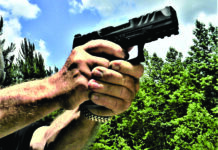
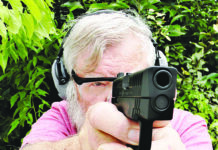
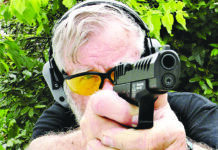
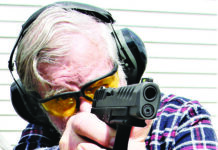
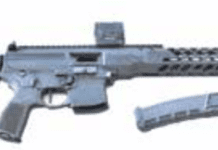
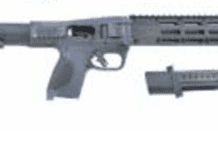
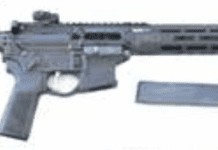


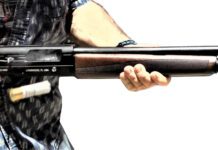
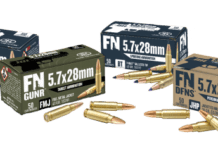
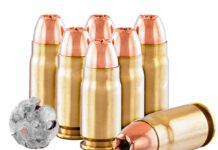
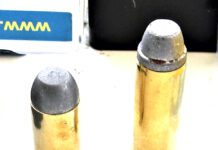
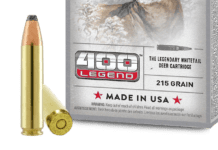
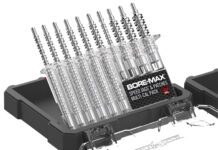
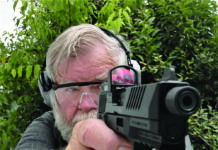
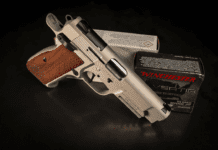
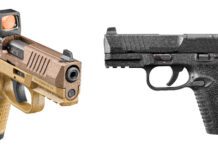
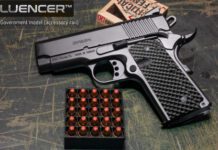


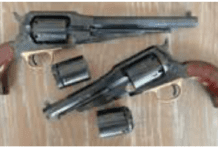
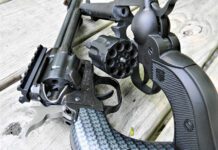

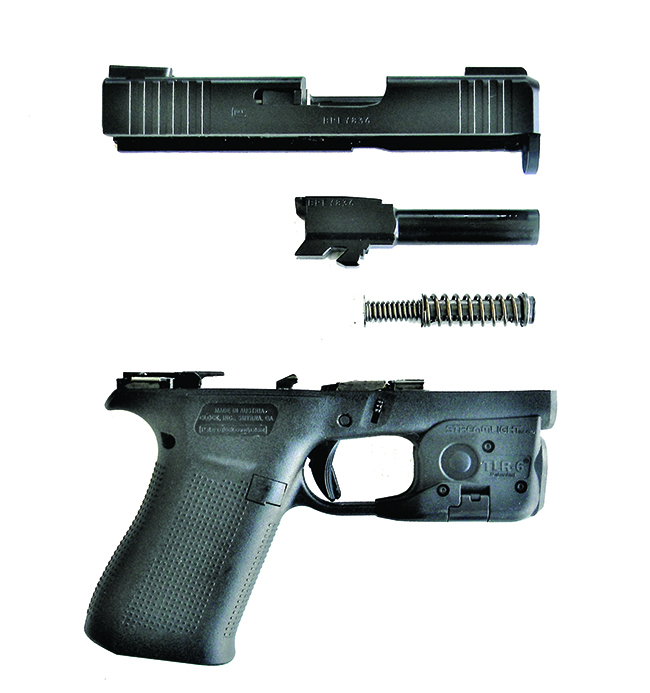

I wonder if you would have done better with the combat accuracy of the Glock 48 with its’ longer sight radius?